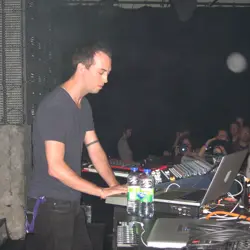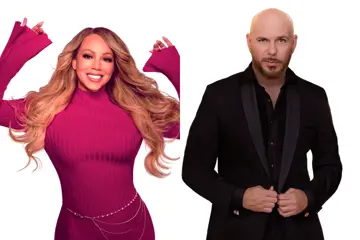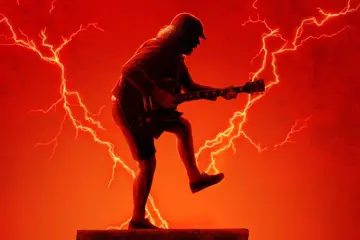 Tim Hecker
Tim Hecker“As a Canadian, there's something great about going to Australia and seeing the other entrails of the British Empire in its mutated form,” says experimental composer Tim Hecker. “There’s inverted weather, inverted position on the planet, inverted way the light falls and reflects. I like the craziness of the place.”
Soon to arrive for a run of shows in Australia, including a performance at the ΩHM Festival of Other Music in Brisbane, the 49-year-old has been a recurring tourist to these parts. By his tally, he’s already visited “six or seven times,” with his first tour coming in 2006 and his last in January 2020, just before the pandemic dawned. He normally likes visiting when it’s deep winter in his adopted hometown of Montréal and summer in Australia.
It’s a unique flip given that Hecker’s music—with its large-scale drones, foggy atmospherics, and sense of isolation—is so often perceived as wintry. That reflects the conditions Hecker routinely works in: wintertime, when he does “most of [his] work.”
“Winter puts me in the mood to bunker down in a studio and just make music,” he offers. “Because it's so evocative when it's snowing outside, the landscape is so different. I'd say that's definitely a part of what I've done.”
That began with his first album under his own name, 2001’s Haunt Me, Haunt Me Do It Again, which included suites called Music For Tundra and Arctic Lover’s Rock. And it continued through to his score for Andrew Haigh’s 2021 TV series The North Water, where Hecker’s ominous drones soundtracked a tale of murderous whalers in the 19th-century Arctic.
In the two decades between those two (arctic) poles, Hecker’s profile grew exponentially, both through acclaim for a run of albums (like 2006’s Harmony In Ultraviolet, 2011’s Ravedeath, 1972, and 2016’s Love Streams) and a shift in culture that embraced the kind of music Hecker makes—abstract, wordless, expansive.
Ambient Works
Ask him about the shift in perceptions around ‘ambient music’, and Hecker gets philosophical, pointing out his disconnection from what’s become a blanket genre.
“I never started out trying to do ambient music. I started doing like IDM music and techno 25 years ago [as Jetone], but I found it constraining. And I wanted to get rid of drum beats,” he begins.
“At the time, there was a limited amount of new age music or artisan-style ambient music in the vein of Aphex Twin. But if you really go back and open the lid to before it was called ambient, you think of stuff like Terry Riley or tape music, [which] I was more interested in [pursuing] that kind of hallucinatory state than defining something.
“It's now become this kind of catch-all that is used in society, like just throw reverb on a couple of chords, and that’s ambient music. That kind of music's almost like serving more as a therapeutic role in our society more than it is a challenging thing, and I've always been interested in that confusion, between placating people with pastoral sounds and mixing in anxious and uneasy and uncertain and ambivalent feelings. To try to make music that amuses myself and, you know, confuses those lines. I'm definitely not interested in being a gatekeeper of ambient music in any way.”
Disharmony In Grey
The one-sheet for Hecker’s latest LP, 2023’s No Highs, summoned this sentiment, calling the record Hecker’s reaction to “the false positive corporate ambient” that clogs playlists in the streaming era. Filled with unease and clutter, it’s out to evoke the environments of contemporary reality rather than the imagined, idyllic landscapes of new-age work.
“I was trying to do something that was not bombastic, nor was it soothing; it was just a kind of angsty thing,” he offers. “I've tried to make epic music before, and I didn't want to do that. I wanted to put out some music that reflected coming out of the pandemic and that psychological space.
“I was really interested in rhythm, and hypnotic pulses, and I went back to a really basic, almost post-bedroom-producer type of approach. Without the kind of extravagant recording scenarios or complex, layered approach I often take to music, it was just pretty stripped down, intentionally thin, light, dense, not dynamic in its compositional arc. Greyscale in audio.”
The flatness of its title evokes not just its landscapes but also the lived experience of lockdowns. Hecker doesn’t look at his time in “super-restrictive” Montreal during the pandemic as negative; he was homeschooling his kids and recording a lot, with the governmental exception for film and media workers giving him what amounted to a “get out jail free pass.”
“I could walk to my studio any time of day or night,” Hecker recounts. “The city was a ghost town, and I would just walk through these empty streets. It was like Children Of Men or 28 Days Later, where it's just desolate: no cars, street lights blowing in the wind, you didn't even have to look as you crossed over major thoroughfares. It was just empty. So, it was a profound time to make music.”
Out of Context
Though its pandemic-era provenance and desolate landscapes seem reflected in the music on No Highs, Hecker is averse to making too much of that context. Or any context at all.
“Didactic music is the worst. The artist statement is a dreary thing because it reduces one's own date night with the enigma. It places in you in some kind of forced conceptual apparatus,” he offers.
“My background is always just making music—tones and chords and texture. Organised sound abstracted out of context. I made instrumental music because I don't want meaning ascribed to it. I want poetics of interpretation, music that's not bludgeoning you with how to interpret something.”
In that way, he admits, his songs are essentially absent of theme and meaning, beyond what any listener brings to the table or interprets from them.
“They're not about anything,” Hecker says. “They’re my ideas of music, my thoughts about heavy metal organ or glissando or tonalities of non-Western turning carried to some absurd extreme. There are these approaches, but ultimately, [the songs] are not about anything. I just make music that is evocative. I feel something, and I can't describe what it is. It's not about, like, childbirth or breaking up with someone or feeling lonely. But those things can be in it.”
Tim Hecker will perform at the ΩHM Festival of Other Music with Locsil on Friday, 15 March. You can find more details on the Brisbane Powerhouse website.






